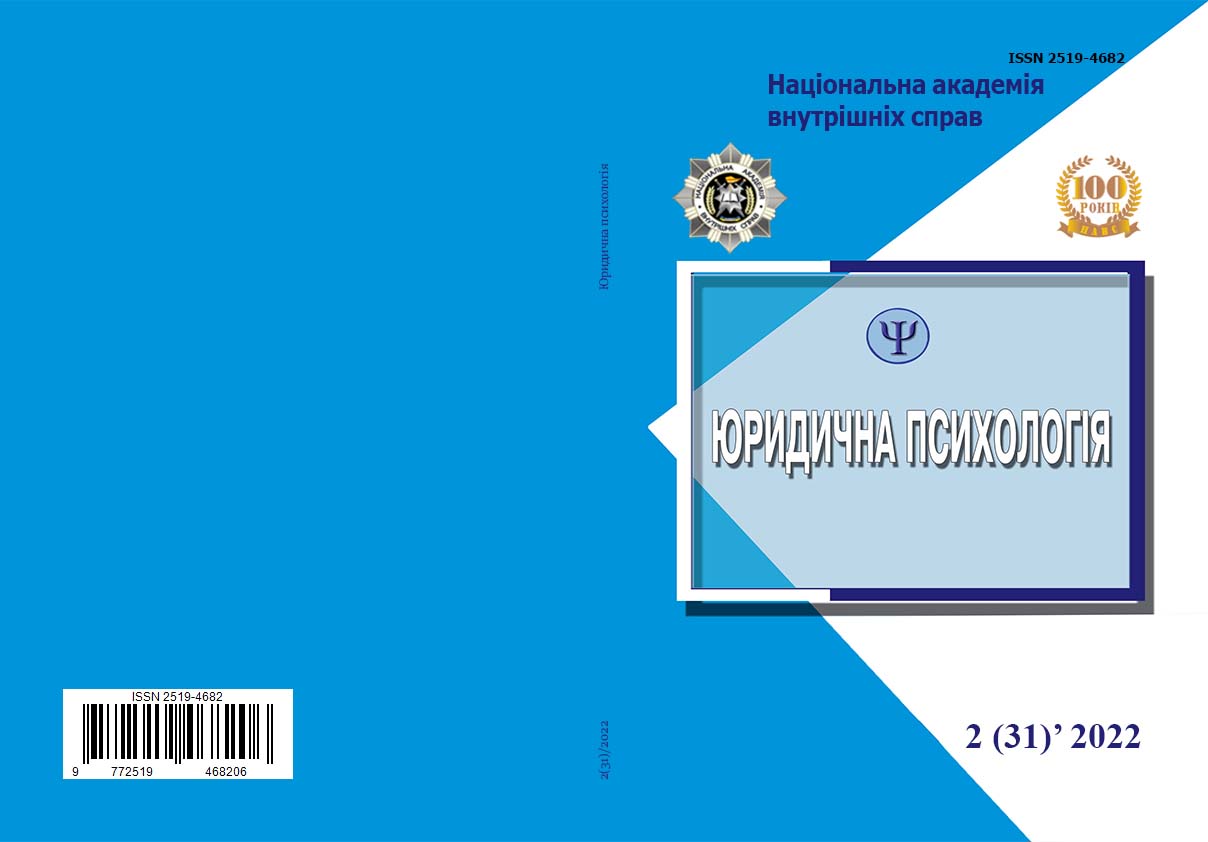Communicative Component of the Police Officer’s Professional Activity
Abstract
Research actuality is due to the need to constantly improve the professional communicative competence of the police officer, as an integral characteristic that determines the ability to solve professional problems and typical professional tasks that arise in real situations of professional activity, using knowledge, professional and life experience, values and abilities. Research aim is to determine the role of the communicative component in the professional activity of a police officer; description of its main components and features that form a high level of communicative competence. The methodology of the analysis of the problem was made up of scientific concepts of the study of certain aspects of professional communication in the activities of the employees of the National Police of Ukraine. Research results. The role of the policeman's communication skills and the prerequisites for their formation, which are components of professional success, are defined. The main determinants of the formation of the professional competence of a police officer and their role in ensuring police activity are outlined. The importance of the communicative component in the professional activity of police officers is analyzed. The essence of communication barriers and their influence on the implementation of the tasks of the communication process has been clarified. The scientific novelty of the article lies in the generalization and systematization of research results regarding the peculiarities of the communicative component in the professional activity of a police officer. The practical meaningfulness is presented in determining the formation of communicative competence as a component of the professional training of a police officer, since its improvement in all spheres of life ultimately means: rationalization of the mechanisms of managing society; establishing dialogue as a priority form of communication, as the only way to solve global problems of «civilizational challenges»; formation of a moral and spiritual personality by expanding the level of responsibility and freedom.
Keywords: communicative process; professional activity; professional competence; communicative skills; determinant; result; rationalization; police officer.
Downloads
References
Bondarenko V., Danylchenko V., Khudiakova N., Krymets, O. Methodological approaches to professional training of future patrol officers. Pedagogical Innovations: Ideas, Realities, Perspectives. 2019. No. 2. P. 80–88. DOI: 10.32405/2413-4139-2019-2-80-88.
Петрова Л., Подліняєва О. Важливі навички сучасного педагога. InterConf. 2021. № 63. С. 57–68. DOI: 10.51582/interconf.21-22.06.2021.06.
Кравченко І. Персоналії в розвитку педагогіки вищої школи. Наукове забезпечення технологічного прогресу XXI сторіччя. 2020. Т. 4. С. 62–64. DOI: 10.36074/01.05.2020.v4.11.
Kozubenko I. V. Communication barriers and ways to overcome them. Наукові Записки. 2022. № 36. С. 195–199.
Захарченко О. Роль та значення післядипломної освіти поліцейських у підвищенні їхнього професійного рівня. Entrepreneurship, Economy and Law. 2020. № 6. С. 138–142. DOI: 10.32849/2663-5313/2020.6.24.
Філіппова Л. В. Професійна рефлексія викладача у вищих навчальних закладах. Наукові Записки. 2021. № 145. С. 199–207. DOI: 10.31392/nz-npu-145.2019.22.
Гірняк А., Васильків О. Психологічні бар’єри у взаємодії викладача й студентів та шляхи їх ефективного подолання. Psychological Prospects Journal. 2019. № 33. С. 79–90. DOI: 10.29038/2227-1376-2019-33-79-90.
Коломієць Н. Професійне зростання викладача вищої школи: реалії та орієнтири. Problems of Modern Teacher Training. 2020. № 1 (21). С. 164–169. DOI: 10.31499/2307-4914.1(21).2020.210941.
Равчина Т. Концептуальні засади педагогічної підготовки викладача вищої школи в контексті сучасних освітніх викликів. Освітні Обрії. 2020. № 50 (1). С. 27–31. DOI: 10.15330/obrii.50.1.27-31.
Корніяк O. Комунікативні засоби психологічного супроводу професійного самоздійснення викладача. Psycholinguistics in a Modern World. 2020. № 15. С. 132–136. DOI: 10.31470/10.31470/2706-7904-2020-15-132-136.
Цюра С., Терзалова А. Нормативне закріплення понять «освітнє середовище», «освітній простір», «освітній процес» у контексті педагогічної термінології. Молодь і ринок. 2021. № 5/184. С. 111–117. DOI: 10.24919/2308-4634.2020.223082.
Никифорова О. Дослідження коригуючого впливу навчання на професійно важливі якості поліцейських. Наукове забезпечення технологічного прогресу XXI сторіччя. 2020. Т. 4. С. 23–25. DOI: 10.36074/01.05.2020.v4.05.
Рубонець О. Когнітивна комунікація. Мультіверсум. Психологічний Атлас. Альманах. 2018. № 5–6. С. 87–99. DOI: 10.35423/2078-8142.2015.5-6.09.
Курова А. Психологія спілкування : навч.-метод. посіб. Одеса : Фенікс, 2020. 79 с. DOI: 10.32837/11300.13107.
Ковальська Н. М., Богадьорова Л. М. Особливості ділового спілкування в освітньому середовищі: психолого-педагогічний аспект. Педагогічний Альманах. 2021. № 46. С. 132–139. DOI: 10.37915/pa.vi46.119.
Думко Н. В. Врахування особистісних запитів курсантів поліції на побудови власної траєкторії навчання. Наукові Записки. 2021. № 145. С. 54–62. DOI: 10.31392/nz-npu-145.2019.06.
Смеречак Л. Особливості педагогічної діяльності викладача вищої школи. Молодь і ринок. 2018. № 11 (166). С. 125–129. DOI: 10.24919/2308-4634.2018.152275.
Abstract views: 251 PDF Downloads: 268
- Authors reserve the right to authorship of their own work and transfer to the magazine the right of the first publication of this work under the terms of the Creative Commons Attribution License, which allows other persons to freely distribute published work with mandatory reference to authors of the original work and the first publication of an article in this magazine.
- Authors have the right to enter into separate additional agreements on non-exclusive dissemination of the work in the form in which it was published in the journal (for example, to post an article in the institution's repository or to publish as part of a monograph), provided that the link to the first publication of the work in this journal is maintained.
- The journal's policy allows and encourages the posting of articles by authors on the Internet (for example, in electronic storehouses of institutions or on personal websites), both before the submission of this manuscript to the editorial office and during its editorial processing, as this contributes to the creation of a productive scientific discussion and positively affects the efficiency and dynamics of citing the published work.




